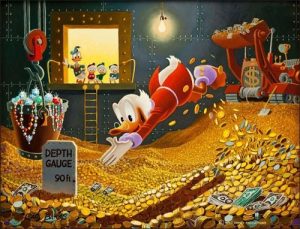** Previously published article, brought back for reasons I have no need nor desire to go into **
You’ve all heard of Amazon right? Oh, come on surely you all have. I myself started using Amazon.com back in the 1990s, when Amazon.co.uk was but a twinkle in its .com daddy’s eyes. I discovered it mainly because of university, more precisely university books and how much the damn things cost if you bought them from “bricks and mortar” bookshops and like most people I never gave much thought to how Amazon could sell them cheaper than Waterstones or whatever bookshop was around, I was an academic damn it! Not a damn entrepreneur and/or business man. I was just glad to save a few dollars (yeah I bought from the .com site then) on my books, especially as I could pay £24.99 here or $19.99 with delivery, it was a no brainer for me and probably every other student I told about it.
Fast forward a couple of years and I started selling things on eBay and on Amazon BIG TIME. My business was the highest rated eBay UK seller account for a number of years and the Amazon feedback and rating wasn’t too shabby either but it was always tough, no matter what you sold some ba*&^rd (usually Amazon) was selling what we sold but cheaper and like every eBay seller I could never quite get my head round “how” exactly. As I understand it (I’m not sure there’s a class about this specifically if you’re an MBA student but maybe) there’s a sort of “unwritten rule” that 40% of a retail price has to be profit to the retailer, anything less is basically considered “not worth getting out of bed for.” So let’s have a look at some mathematics here:
1 x Marley & Me DVD – Wholesale price £13.61 plus VAT (this is just an example, it was that price when it was released, it isn’t worth squat now) = £16.33 just to get it from a DVD wholesaler (a rare beast these days, they’ve virtually all gone under.) Amazon probably got a “discount” on that £13.61 of up to 40% (I never heard of anybody getting more than that, even the “mighty” Amazon) = £13.61 -40% plus VAT = £9.80 and Amazon probably flogged it for £10.99 maybe? That’s not a lot of profit % there. So looking at Amazon’s business model back in my eBay/Amazon (I no longer sell on either) era I tended to scratch my head and go “eh? You what? Run that by me again.”
It turns out Amazon doesn’t make any money. Worse still, for Amazon (but not for CEO Jeff Bezos but we’ll come back to that) the shareholders are starting to get a bit pi**ed about this little fact. Since Amazon’s launch (.com was the first in the USA) in 1994 Amazon has struggled to actually break even, let alone make a profit. Rejecting standards of success such as “loads of dollars in the bank and happy shareholders kerching” Amazon measures its success with stuff like “profitless prosperity.”

You’ll just have to “imagine” the concubines I guess ….
So we come to: profitless prosperity. This is basically a way of saying that the company is growing and growing until it reaches a critical point when it becomes all powerful and makes so much money the directors and shareholders will be diving into swimming pools of Dollars, Pounds and Euros whilst surrounded by hordes of gorgeous concubines and admirers (but presumably no ducks) and being finally able to buy a gold plated Rolls Royce or something equally pointless. Despite having had an extensive university education none of it was in business or finance but I have learnt a handful of “rules” over the years:
- There’s ALWAYS competition (unless you’re the first, in which case there soon will be competition.)
- Some ba*&^rd will always but always come along thinking “I can sell that as well but cheaper, we’ll be rich mwuahahaha.”
- Nothing lasts forever.
- Don’t buy shares in Amazon (something else we’ll come back to later.)
Amazon also have something called “free cash flow” which at $2 billion a year sounds mighty impressive don’t it? Heck, what I could do with $2 billion a year, I’d be up to my eyeballs in concubines and gold plated Aston Martins. Trouble is free cash flow in pragmatic terms basically means “the money we pay suppliers with on time.” Well, errr, paying suppliers is kind of important you know? Amazon wouldn’t have a business at all if they didn’t do that and that money comes under “expense” on your Excel spreadsheet (although I’m guessing Amazon’s finance department has gone beyond Excel?) and not under “net profit.”

Yeah, I actually Googled for gold plated Aston Martins and found one …
For some reason I can’t quite get, these are seen as indicators of a good, solid and successful business model. I can see why Amazon is so big, a lot of people are “vultures” (I mean this in a kind way, I do understand you want to save money) and if widget A is cheaper at Amazon than at Target/Gamestop/Virgin Records/HMV/whatever then people will buy widget A at Amazon. The harsh truth here is the average “man in the street” doesn’t care if Amazon goes under tomorrow as long as he only paid $10 delivered for Taylor Swift’s latest CD as oppose to $15 from the shop up the road. It’s not the man in the street’s problem after all.
So how did Amazon get so big? It’s a PLC, a public limited company. Some basic explanation here as I realise not everybody will understand how this works (feel free to skip down a few sentences if you want.) In the United Kingdom where I reside there are essentially three main types of business:
- A sole trader. This is someone who starts a business for themselves and they are essentially “the business”, if it goes under money wise they go under as well. This tends to be your basic stuff like taxi drivers, couriers, small shop owners and the like. Don’t be fooled by “sole”, a sole trader can still have employees, the “sole” part just means one person is the business from a legal perspective.
- A limited company. This is where a company is registered with a government organisation (in the case of the United Kingdom Companies House) and the “one person” who registers the company owns one “share” of the company for which they pay £1.00 (sterling, about US $1.60) and the company becomes a “legal entity” in its own right, if it goes under it goes under but the shareholder doesn’t go under because he/she isn’t legally responsible for the company although they have an obligation to keep the company in good standing and accountable to scrutiny etc.
- A PLC, a public limited company. Most limited companies start as 1 person 1 share 1 pound although if two people start it 1 person may have 1 share the other 4 shares so the owner of 4 shares gets 80% of the profit (4+1=5 and 4 = 80% of 5 etc) or it may be a 1 share each 50/50 arrangement, whatever. Later on a limited company (I presume a company has to be limited as a prerequisite to becoming a PLC) can “float” their company on the stock market and make available more “shares” of the company to all and sundry, this is a “public” (hence the all and sundry) limited company. The shares are then bought and sold on the stock market, you can buy some shares at say £2.50 each today and maybe next week they’ll be worth £5.00 at which point you can sell them, kerching 100% profit minus a bit of commission and money in the bank.)
Amazon is a public limited company. I myself owned several thousand pounds worth of shares in Amazon until I sold them last year, spring 2014 to be precise. In October 2014 Amazon’s shares took a hit and lost 20% of their value (I was a bit early in selling them but spring was better than October obviously!) and Amazon made a loss of US $437,000,000 for the YEAR, a tenfold increase on the previous year’s loss. January 2015 and the next “loss” is US $241,000,000, damn that’s a lot of money. Naturally Amazon’s directors are keen to reassure the shareholders (not me I’m out) but it doesn’t look good does it?
Remember that £1.00 a share to start the business? When a £1.00 a share limited company becomes a public limited company and grows and the value of shares goes up the directors (themselves being members of the public as well as directors) can buy more shares in the company, and that’s how the CEO of Amazon Jeff Bezos got to be worth US $3800,000,000 so he’s alright (as long as he sells them quickly) even if Amazon went bankrupt tomorrow …. It comes across to me as a sort of “retail charity”, all it achieves is giving consumers cheaper products giving nothing back to the shareholders, the people who basically invested in Amazon (granted some were just hoping to buy them and flog them later for a profit like myself), but if it went under think how many people would lose their jobs and businesses that would go under because they supply Amazon and so on.
It’s all a bit grim if you ask me.
Steve

